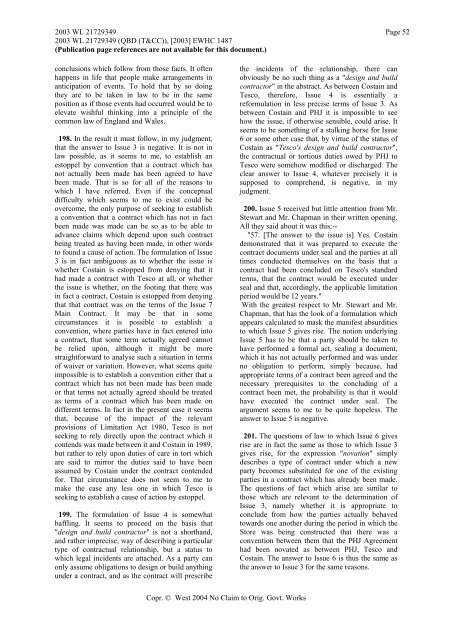Tesco v Constain - Thomson Reuters
Tesco v Constain - Thomson Reuters
Tesco v Constain - Thomson Reuters
You also want an ePaper? Increase the reach of your titles
YUMPU automatically turns print PDFs into web optimized ePapers that Google loves.
2003 WL 21729349 Page 522003 WL 21729349 (QBD (T&CC)), [2003] EWHC 1487(Publication page references are not available for this document.)conclusions which follow from those facts. It oftenhappens in life that people make arrangements inanticipation of events. To hold that by so doingthey are to be taken in law to be in the sameposition as if those events had occurred would be toelevate wishful thinking into a principle of thecommon law of England and Wales.198. In the result it must follow, in my judgment,that the answer to Issue 3 is negative. It is not inlaw possible, as it seems to me, to establish anestoppel by convention that a contract which hasnot actually been made has been agreed to havebeen made. That is so for all of the reasons towhich I have referred. Even if the conceptualdifficulty which seems to me to exist could beovercome, the only purpose of seeking to establisha convention that a contract which has not in factbeen made was made can be so as to be able toadvance claims which depend upon such contractbeing treated as having been made, in other wordsto found a cause of action. The formulation of Issue3 is in fact ambiguous as to whether the issue iswhether Costain is estopped from denying that ithad made a contract with <strong>Tesco</strong> at all, or whetherthe issue is whether, on the footing that there wasin fact a contract, Costain is estopped from denyingthat that contract was on the terms of the Issue 7Main Contract. It may be that in somecircumstances it is possible to establish aconvention, where parties have in fact entered intoa contract, that some term actually agreed cannotbe relied upon, although it might be morestraightforward to analyse such a situation in termsof waiver or variation. However, what seems quiteimpossible is to establish a convention either that acontract which has not been made has been madeor that terms not actually agreed should be treatedas terms of a contract which has been made ondifferent terms. In fact in the present case it seemsthat, because of the impact of the relevantprovisions of Limitation Act 1980, <strong>Tesco</strong> is notseeking to rely directly upon the contract which itcontends was made between it and Costain in 1989,but rather to rely upon duties of care in tort whichare said to mirror the duties said to have beenassumed by Costain under the contract contendedfor. That circumstance does not seem to me tomake the case any less one in which <strong>Tesco</strong> isseeking to establish a cause of action by estoppel.199. The formulation of Issue 4 is somewhatbaffling. It seems to proceed on the basis that"design and build contractor" is not a shorthand,and rather imprecise, way of describing a particulartype of contractual relationship, but a status towhich legal incidents are attached. As a party canonly assume obligations to design or build anythingunder a contract, and as the contract will prescribethe incidents of the relationship, there canobviously be no such thing as a "design and buildcontractor" in the abstract. As between Costain and<strong>Tesco</strong>, therefore, Issue 4 is essentially areformulation in less precise terms of Issue 3. Asbetween Costain and PHJ it is impossible to seehow the issue, if otherwise sensible, could arise. Itseems to be something of a stalking horse for Issue6 or some other case that, by virtue of the status ofCostain as "<strong>Tesco</strong>'s design and build contractor",the contractual or tortious duties owed by PHJ to<strong>Tesco</strong> were somehow modified or discharged. Theclear answer to Issue 4, whatever precisely it issupposed to comprehend, is negative, in myjudgment.200. Issue 5 received but little attention from Mr.Stewart and Mr. Chapman in their written opening.All they said about it was this:--"57. [The answer to the issue is] Yes. Costaindemonstrated that it was prepared to execute thecontract documents under seal and the parties at alltimes conducted themselves on the basis that acontract had been concluded on <strong>Tesco</strong>'s standardterms, that the contract would be executed underseal and that, accordingly, the applicable limitationperiod would be 12 years."With the greatest respect to Mr. Stewart and Mr.Chapman, that has the look of a formulation whichappears calculated to mask the manifest absurditiesto which Issue 5 gives rise. The notion underlyingIssue 5 has to be that a party should be taken tohave performed a formal act, sealing a document,which it has not actually performed and was underno obligation to perform, simply because, hadappropriate terms of a contract been agreed and thenecessary prerequisites to the concluding of acontract been met, the probability is that it wouldhave executed the contract under seal. Theargument seems to me to be quite hopeless. Theanswer to Issue 5 is negative.201. The questions of law to which Issue 6 givesrise are in fact the same as those to which Issue 3gives rise, for the expression "novation" simplydescribes a type of contract under which a newparty becomes substituted for one of the existingparties in a contract which has already been made.The questions of fact which arise are similar tothose which are relevant to the determination ofIssue 3, namely whether it is appropriate toconclude from how the parties actually behavedtowards one another during the period in which theStore was being constructed that there was aconvention between them that the PHJ Agreementhad been novated as between PHJ, <strong>Tesco</strong> andCostain. The answer to Issue 6 is thus the same asthe answer to Issue 3 for the same reasons.Copr. © West 2004 No Claim to Orig. Govt. Works
















